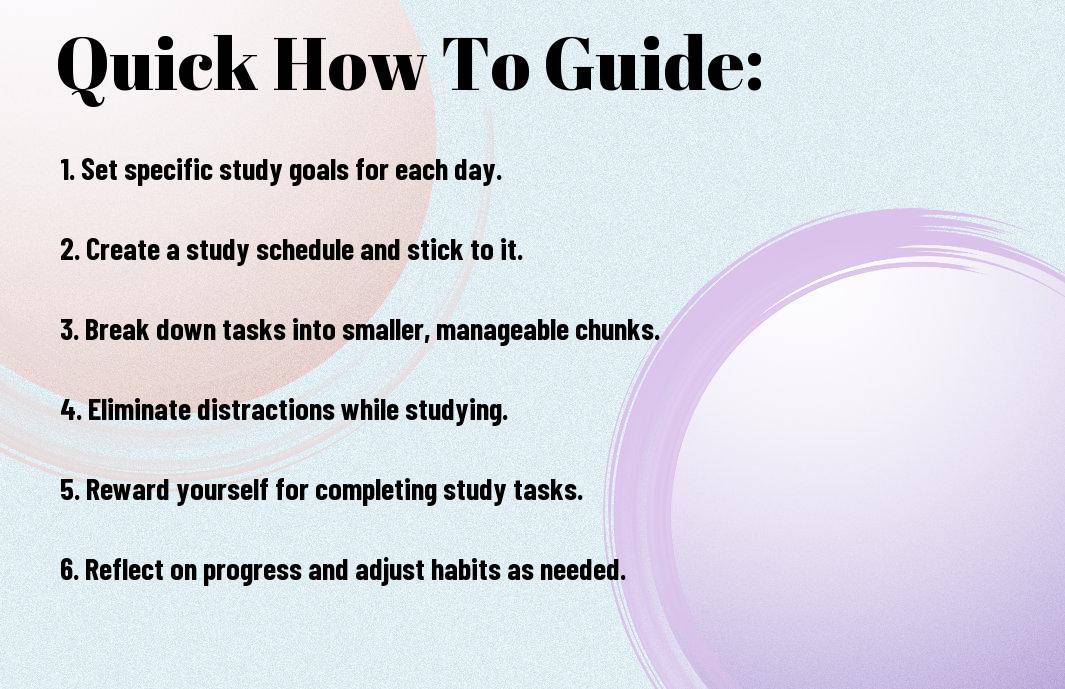Just starting with your exam preparation and feeling overwhelmed? Implementing Atomic Habits in your study routine can make a significant difference in your productivity and results. By focusing on small, consistent changes, you can build a strong foundation for success. If you want to learn more about applying Atomic Habits to studying effectively, check out this article on How to Apply Atomic Habits to Studying to Get Better Grades.
Key Takeaways:
- Focus on Consistency: Building atomic habits for exam preparation involves regularly studying and reviewing material.
- Start Small: Break down your exam preparation tasks into smaller, more manageable chunks to avoid feeling overwhelmed.
- Set Clear Goals: Define your exam goals and create a study plan with specific objectives to keep you on track.
- Establish a Routine: Design a study schedule and stick to it to cultivate a habit of consistent studying.
- Track Your Progress: Monitor your study habits and progress towards your exam goals to make adjustments as needed.
- Reward Yourself: Celebrate small victories along the way to reinforce positive study habits and motivation.
- Stay Persistent: Building atomic habits takes time and effort, so stay committed to your exam preparation routine despite challenges.

Starting Small: Building Exam-Prep Habits That Stick
Even when the task ahead seems daunting, starting small is the key to building lasting exam-prep habits. Making incremental changes to your study routine can have a significant impact on your success in the long run.
Why Small Changes Make a Big Difference
Small changes are more sustainable because they are easier to incorporate into your daily life. By starting with manageable study sessions or setting small goals, you can gradually increase your workload without feeling overwhelmed. Consistency is key when it comes to exam preparation, and building habits through small changes helps you stay on track and motivated.
Creating Your First Successful Study Habit
Some of the most successful students have one thing in common – they have mastered the art of creating effective study habits. Start by choosing a specific time and place to study each day. This consistency will signal to your brain that it’s time to focus, making it easier to get into the study mindset.
Understanding your learning style can also greatly impact the success of your study habits. Whether you’re a visual learner who benefits from diagrams and charts or an auditory learner who thrives on listening to lectures, tailoring your study habits to your individual preferences can make a significant difference.

The Four Laws of Behavior Change for Exams
Not all study strategies are created equal when it comes to exam preparation. By leveraging the four laws of behavior change, you can optimize your study routine for success. These laws – making it obvious, attractive, easy, and satisfying – can help you build effective habits that lead to better exam performance.
Making It Obvious: Design Your Environment for Study Success
Any successful study session starts with setting up your environment for focus and productivity. Eliminate distractions like your phone or noisy surroundings. Create a dedicated study space with all the imperatives at hand – textbooks, notes, and study materials. By making your study environment clear and organized, you can set yourself up for efficient learning.
Making It Attractive: Tips to Increase Study Motivation
Success in exam preparation is closely tied to your motivation levels. To make studying more attractive, try setting specific goals and rewards for yourself. Break down your study sessions into manageable chunks, and set aside time for leisure activities as a reward for completing tasks. Recognizing your progress and achievements can keep you motivated and engaged in your exam preparation journey.
- Setting specific goals can give you a clear direction for your studies.
- Rewarding yourself for completing study tasks can boost your motivation levels.
- Celebrating small victories along the way can keep you motivated and engaged.
- Recognizing how far you’ve come can provide the extra push to keep going.
Making It Easy: Simplifying Your Study Process
Motivation plays a key role in your study routine, but so does making the process easy for yourself. Start by breaking down your study material into smaller, bite-sized chunks. Use techniques like mind mapping or color-coding to organize your notes and make information easier to digest. This approach can help you maintain consistency and focus in your study sessions.
This can lead to better retention and understanding of the material, ultimately improving your exam performance. By simplifying your study process, you can reduce overwhelm and make studying more manageable.
Making It Satisfying: Rewarding Your Progress
Motivation is often fueled by the sense of accomplishment and progress. Celebrate your milestones during your exam preparation journey to keep yourself motivated. Implement a reward system where you treat yourself after completing study goals. Making your study sessions rewarding and enjoyable can create a positive cycle of motivation and productivity.
By recognizing your efforts and progress, you can stay motivated to keep pushing forward towards your exam goals. Don’t underestimate the power of small rewards in keeping you on track and motivated throughout your exam preparation.
Crafting Your Personalized Exam Preparation Strategy
Now, as you commence on your exam preparation journey, it’s crucial to tailor your approach to suit your unique learning style and preferences. By crafting a personalized strategy, you can optimize your study sessions and enhance your chances of success.
Identifying Your Learning Style to Enhance Memory Retention
Strategy: Take some time to reflect on how you learn best. Are you a visual learner who benefits from diagrams and charts? Or perhaps you learn more effectively through auditory cues, such as listening to recorded lectures or study music. Identifying your learning style can help you structure your study materials in a way that aligns with how your brain processes information, leading to enhanced memory retention and improved understanding of the subject matter.
Scheduling and Planning Your Study Sessions Effectively
The key to effective exam preparation lies in how you manage your time and schedule your study sessions. Create a study timetable that takes into account your peak productivity hours and allows for regular breaks to prevent burnout. Use tools like calendars or apps to help you stay organized and on track with your study goals.
Additionally, consider breaking down your study material into smaller, manageable chunks to avoid overwhelm and make steady progress towards your exam preparation. By identifying the most important topics and dedicating specific time slots to each, you can ensure a well-rounded review of the material while maintaining a healthy balance between study and relaxation.
Overcoming Common Pitfalls and Staying on Track
After reading ‘Atomic Habits’ by James Clear, you might be eager to implement the strategies into your exam preparation routine. If you’re wondering how others have started applying these lessons, check out this insightful Quora thread on the topic.
Dealing with Procrastination and Distractions
Overcoming procrastination and distractions is crucial when it comes to staying on track with your exam preparation. One effective strategy is to break down your study sessions into smaller, manageable tasks. This not only makes it less overwhelming but also helps you stay focused and motivated. Additionally, try to identify your biggest distractors and find ways to eliminate or minimize their impact. Whether it’s turning off your phone notifications or finding a quiet study space, creating a conducive environment for learning is key.
Adjusting Habits When Life Throws You Curveballs
Common life challenges can disrupt your study routine, but it’s important to remember that setbacks are a natural part of the process. When unexpected events occur, such as family emergencies or sudden workload increases, it’s crucial to adapt your study habits accordingly. This might mean adjusting your study schedule, seeking support from friends or mentors, or even just giving yourself some grace during challenging times.
To summarize, staying on track with your exam preparation requires proactive efforts to overcome procrastination and distractions, as well as flexibility to adjust your habits when life presents unforeseen challenges. By implementing the strategies from ‘Atomic Habits’ and staying resilient in the face of obstacles, you can set yourself up for success in your exams.
Measurement and Analysis: Tracking Your Progress
Once again, we research into the crucial aspect of tracking your progress when preparing for exams. Measurement and analysis are vital in improving your study habits and achieving your academic goals. By keeping track of your progress, you can identify what’s working well and what needs adjustment.
The Role of Reflection in Study Habits
While preparing for exams, taking the time to reflect on your study habits can yield valuable insights. Reflecting on how you study, when you study best, and what methods are most effective for you can help you optimize your exam preparation. Consider keeping a study journal to log your reflections and track your progress over time.
How to Measure Improvement Without Getting Demotivated
Measurement is key when tracking progress, but it’s important to do so in a way that doesn’t lead to demotivation. To measure improvement effectively, set specific, achievable goals for yourself. Celebrate small victories along the way and acknowledge your progress, no matter how minor. Be mindful of, progress is progress, no matter how small.
To prevent demotivation, avoid comparing yourself to others and focus on your own growth and development. Stay consistent in your efforts and trust the process. By measuring your improvement in a positive and constructive manner, you’ll stay motivated and on track towards exam success.
Advanced Techniques: Deepening Your Exam Preparation
-
- The Power of Habit Stacking for Complex Subjects
Actions Subjects Review flashcards Science Practice essay writing History
- The Power of Habit Stacking for Complex Subjects
The Power of Habit Stacking for Complex Subjects
An effective way to enhance your exam preparation for complex subjects is by utilizing the power of habit stacking. This technique involves linking new study habits to existing ones to create a strong routine. For example, if you regularly review flashcards for your science exams, you can stack on the habit of practicing essay writing for history exams immediately after. This way, you are more likely to consistently practice both disciplines without feeling overwhelmed.
Creating Mental Models to Solve Tricky Problems
Habit stacking can be a game-changer when it comes to tackling challenging subjects. By establishing a routine that combines different study tasks, you can enhance your understanding and retention of complex topics in a more efficient manner. This method not only helps in breaking down larger tasks into smaller, manageable chunks but also ensures that you cover all necessary material without feeling burned out.
This advanced technique is particularly beneficial for students preparing for extensive exams that require a deep understanding of multiple subjects. By integrating habit stacking into your study routine, you can maximize your productivity and make the most out of your study sessions. Recall, consistency is key when it comes to mastering complex subjects.
To wrap up
So, in conclusion, applying the principles of Atomic Habits to your exam preparation can greatly enhance your study routine. By focusing on small, consistent actions and setting up an environment that supports your learning goals, you can make significant progress over time. Keep in mind, it’s about progress, not perfection. For more tips on surviving Year 12 exams, you can check out this article on 5 tips for surviving Year 12 exams.
FAQ
Q: Why is it important to develop atomic habits for exam preparation?
A: Developing atomic habits for exam preparation is crucial because it helps in creating a structured and consistent study routine, leading to better academic performance.
Q: What are atomic habits?
A: Atomic habits are small, incremental changes or actions that when practiced consistently, can lead to significant improvements over time.
Q: How can I apply the principles of atomic habits to my exam preparation?
A: You can apply the principles of atomic habits by breaking down your study tasks into smaller, manageable parts, and creating a schedule to consistently work on them each day.
Q: What are some examples of atomic habits for exam preparation?
A: Examples of atomic habits for exam preparation include studying for a focused 25-minute session each day, summarizing key points after each study session, and reviewing previous study material regularly.
Q: How can I stay motivated to follow through with my atomic habits for exam preparation?
A: You can stay motivated by setting specific goals, tracking your progress, rewarding yourself for small achievements, and finding an accountability partner to keep you on track.
Q: How long does it take to form a new atomic habit for exam preparation?
A: It can take anywhere from 21 to 66 days to form a new habit, depending on the individual and the complexity of the habit. Consistency is key to making the habit stick.
Q: What should I do if I miss a day of following my atomic habits for exam preparation?
A: If you miss a day, don’t be too hard on yourself. Instead, acknowledge the slip-up, recommit to your habits, and continue moving forward with your study routine.
Expand your reading
Night Before Planning – Preparing for Next-Day Productivity the Night Before
Learning to Say No – The Importance of Prioritizing Tasks and Commitments
SMART Goals – George T. Doran’s Method for Setting Clear and Achievable Goals
The 2 Minute Rule – David Allen’s (popularized) Trick to Overcome Procrastination and Start Tasks
The Science of Concentration in The Art of Focus
The One Thing – Gary Keller and Jay Papasan’s Focus on Making Everything Else Easier
Flow State – Mihaly Csikszentmihalyi’s Method to Achieve Optimal Focus and Enjoyment
Eisenhower Matrix – Dwight D. Eisenhower’s Strategy to Prioritize Tasks by Urgency and Importance
Study Routines Transformed: Unleash Atomic Habits for Students to Boost Your Studies



